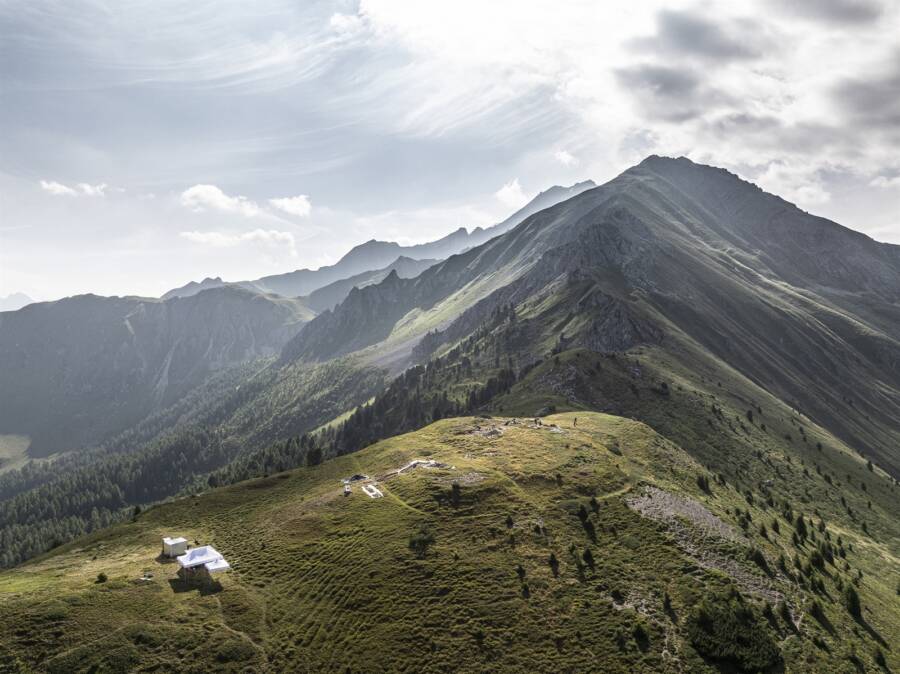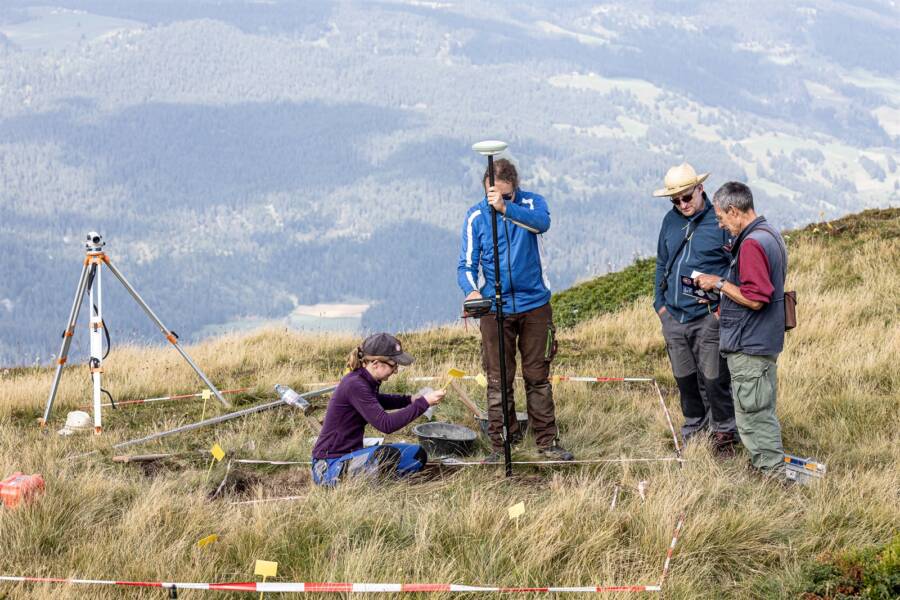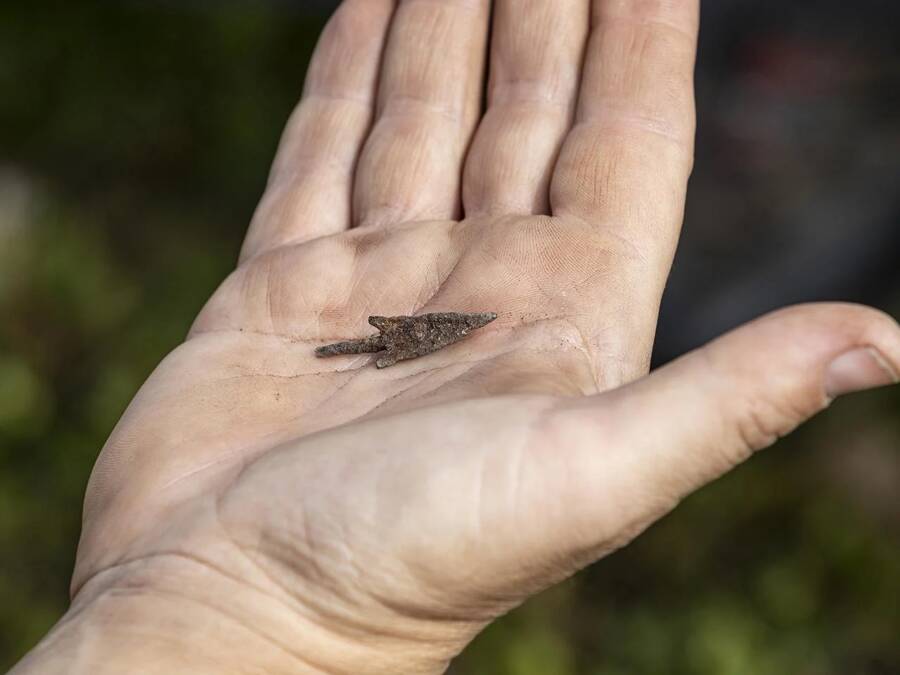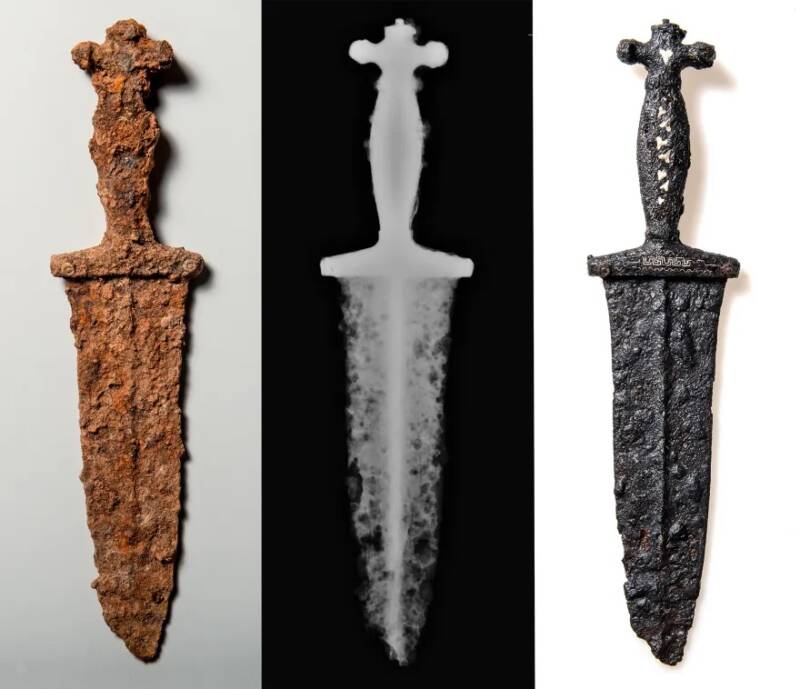Dating back 2,000 years, this encampment was presumably used by the Roman Legions during a battle at nearby Crap Ses Gorge in 15 B.C.E., amid Emperor Augustus' conquest of the Alps.

Andrea BadruttThe Roman military camp was found 3,000 feet above the site of a battle fought in 15 B.C.E.
During archaeological excavations in the Swiss Alps, one volunteer decided to set off and explore a nearby peak on their own. Little did they know that they would discover the remains of an ancient Roman military camp buried just beneath the surface — and more than 7,200 feet above sea level.
Researchers were initially investigating the site of an ancient battlefield in Oberhalbstein when the discovery of the camp was made, providing the team with even greater insight into the Roman military’s operations in the region. With this new information, researchers say it is more possible than ever before to precisely trace the advance of Roman forces through the Alps more than 2,000 years ago.
The Discovery Of A Roman Military Camp In The Swiss Alps
Since 2021, researchers and students from the University of Basel have worked in collaboration with the Archaeological Service of Graubünden to investigate an ancient Roman battlefield in the Oberhalbstein region of the Swiss Alps. The goal of the project was to create a clear picture of the Roman campaign against the local Suanetes tribe for control over this corner of the Alps, surveying the area with Light Detection and Ranging (LiDAR) technology to look for traces of military activity.

Andrea BadruttResearchers in the Swiss Alps using LiDAR technology to examine the landscape.
Last fall, during these investigations, one volunteer made the trek to the peak of the mountaintop of Colm la Runga, roughly 3,000 feet above the location of the battlefield. Scanning the peak with LiDAR, the volunteer noticed buried structures on the mountain’s peak, according to a statement from the Canton of Graubünden.
Shortly after, archaeologists identified the structures as the remains of a 2,000-year-old Roman military camp. Further analysis revealed a detailed overview of the camp and its various structures.

Andrea BadruttA Roman arrowhead found at the military encampment.
Based on their findings, researchers concluded that the camp had once been fortified with three ditches and a rampart barrier, which occupied a strategic position, allowing the forces of ancient Rome to control access to the valleys surrounding this mountain pass. Geophysical surveys and further excavations also unearthed various weapons and military equipment, such as sling bullets and shoe nails.
Dating the artifacts, researchers determined that the campsite had been built sometime around 20 B.C.E., meaning it was used around the same time that the battle on the fields below took place.
Further Research Into A Pivotal Battle Fought 2,000 Years Ago
Prior to the ongoing investigation that began in 2021, very little was known about any ancient Roman battles fought on Swiss territory. There was, however, other evidence of Roman occupation in the region: elegant columns, villas, amphitheaters, and the remains of ancient settlements that dot the Swiss landscape. Surely, researchers thought, there must be some evidence of the military conflicts that helped shape the history of the area.
Operating on this assumption, a team of roughly 40 scientists from the universities of Basel and Zurich collaborated with volunteer metal detectorists to find the evidence that was surely out there. It didn’t take them long to find remnants from battles long forgotten. In fact, All That’s Interesting reported on some of those early findings in December 2023, particularly the discovery of a 2,000-year-old dagger in a remote mountain region — the very same one that is now the focus of the larger study.

CVMBATThe 2,000-year-old Roman dagger found by an amateur detectorist that helped researchers identify the site of this ancient battle.
The region has proven to be a treasure trove of ancient discoveries. In the autumn of 2023 alone, researchers uncovered more than 300 objects from the site over the course of just three weeks. Using these artifacts, and now with the discovery of the Roman military camp, researchers have begun to piece together the events of an overlooked, historic battle that occurred on these mountains in the late first century B.C.E.
According to the research team, a force of roughly 2,000 Roman units marched through the Alps and clashed with a group of 500 to 1,000 local fighters at the top of the hill. The battle was likely decisively won by the Romans, given their established presence in the region. Unfortunately, researchers are facing one key issue: there are no historical sources to help corroborate their findings.
“We do not have any sources but given the distribution of the finds and the fact that we have many broken pieces of equipment, we believe the Suanetes lost,” said Hannes Flück, an archaeology professor helping to coordinate the project.
Despite the lack of a historical record, the recent discoveries at the site help to illustrate the events of this decisive battle. As more research is conducted at the site, it is entirely possible that researchers will discover the metaphorical “smoking gun” that will finally help to tell this ancient tale.
After reading about this discovery in the Swiss Alps, learn more about the history of the Roman Empire and why it eventually fell. Then, learn about the Picts, another ancient group who once stood strong against the Roman Empire.





